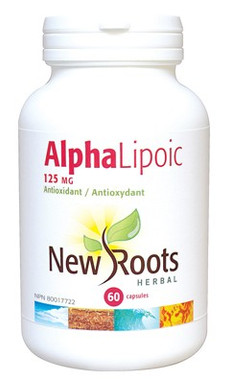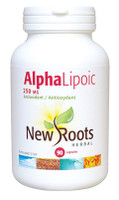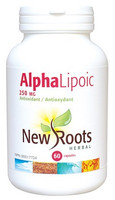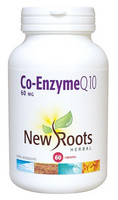- Home
- Fitness & Sports
- Amino Acids
- New Roots Alpha Lipoic 125 mg, 60 Capsules
Product Description
alpha-Lipoic acid may be one of the most important antioxidants available that also recycle vitamin C. alpha-Lipoic acid should be part of your first line of defense against free radicals.
Ingredients
| Each vegetable capsule contains: | |
| dl-alpha-Lipoic acid | 125 mg |
Suggested Use
Detailed Description
If its essential role in health is any indication, alpha-lipoic acid may very well join the ranks of vitamins C and E as part of your first line of defense against free radicals. Discovered in 1951, it serves as a coenzyme in the Krebs cycle and in the production of cellular energy. In the late 1980s, researchers realized that alpha-lipoic acid had been overlooked as a powerful antioxidant. Over the past few years, the pace of research on lipoic acid has increased dramatically. Several qualities distinguish alpha-lipoic acid from other antioxidants, and it has been described at various times as the “universal,” “ideal,” and “metabolic” antioxidant. It neutralizes free radicals in both the fatty and watery regions of cells, in contrast to vitamin C (which is water-soluble) and vitamin E (which is fat-soluble).
The body routinely converts some alpha-lipoic acid to dihydrolipoic acid, which appears to be an even more powerful antioxidant. Both forms of lipoic acid quench peroxynitrite radicals, an especially dangerous type consisting of both oxygen and nitrogen, according to a recent paper.* Peroxynitrite radicals play a role in the development of atherosclerosis, lung disease, chronic inflammation, and neurological disorders.
alpha-Lipoic acid also plays an important role in the synergism of antioxidants; what some doctors prefer to call the body’s “antioxidant network.” It directly recycles and extends the metabolic lifespans of vitamin C, glutathione, and coenzyme Q10, and it indirectly renews vitamin E.
In Germany, alpha-lipoic acid is an approved medical treatment for peripheral neuropathy, a common complication of diabetes. It speeds the removal of glucose from the bloodstream, at least partly by enhancing insulin function, and it reduces insulin resistance, an underpinning of many cases of coronary heart disease and obesity. The therapeutic dose for lipoic acid is 600 mg daily. The richest food source of alpha-lipoic acid is red meat.
From a therapeutic viewpoint, few natural antioxidants are ideal. An ideal therapeutic antioxidant should fulfill several criteria; these include absorption from the diet, conversion in cells and tissues into usable form, a variety of antioxidant actions (including interactions with other antioxidants) in both membrane and aqueous phases, and low toxicity. alpha-Lipoic acid is unique among natural antioxidants in its ability to be a highly effective therapeutic agent in a number of conditions in which oxidative damage has been implicated.
* Whiteman, M., H. Tritschler, and B. Halliwell. “Protection against peroxynitrite-dependent tyrosine nitration and alpha 1-antiproteinase inactivation by oxidized and reduced lipoic acid.” FEBS Letters Vol. 379, No. 1 (1996): 74–76.
 Loading... Please wait...
Loading... Please wait...











